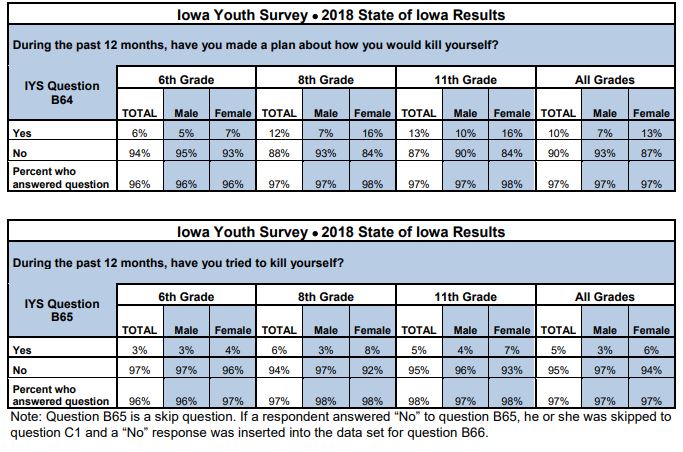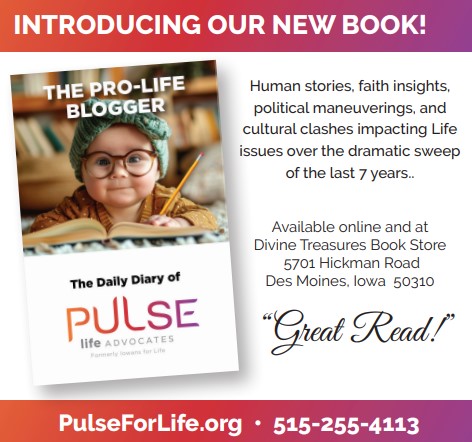The Iowa Standard is a free online news source so we can reach as many people as possible. But we need to raise money! We are asking our readers to help support us as a news alternative entering 2020. If you could, please consider showing a sign of support to The Iowa Standard by making a contribution here. Or, you can use Venmo and make a contribution to @Iowa-Standard-2018.
You could also send a check to:
PO Box 112
Sioux Center, IA 51250
Do Iowa parents know what their children are being asked in school?
That’s the question some want an answer to based on the 2018 Iowa Youth Survey.
The survey produced 70,451 validated records from students across Iowa. There were 1,360 student responses from non-public schools. Records were identified from 225 of Iowa’s 330 public school districts. There were results from 13 of the 170 non-public schools. Students in sixth, eighth and 11th grade were surveyed. The records represent students from all 99 counties.
The survey contains 212 questions. It’s divided into seven sections. Most participants were anywhere from 11 years old to 18. Some 10-year-olds also participated.
Questions are asked about drug use, values, suicide, home life and many other topics.
Concerned Women For America of Iowa posted the following on Facebook:
“Iowa schools have proven themselves incapable of handling sensitive topics. Very personal information and privacy of thought should be protected, not prodded in classroom discussion of peers, and certainly should not be sold to third-party vendors as is usually, if not always, the case with assessment tools like IYS.
“Experts warn mental health fulfills part of the SEL-Social Emotional Learning component of Common Core State Standards with the infrastructure for large-scale data collection already in place. The IYS is one of those tools already in use and one more reason Senators should stop SF 376.
“The IYS is given to (6th), 8th and 11th graders, and no doubt a very small part of a much larger curriculum, but the lack of judgement in the invasive questions of the IYS rightfully makes one question what other dark holes students are dropped into at school.
“Browse through the questions. Would you want to answer those and turn them into your boss or one in authority over you? Your kids don’t either, they feel awkward and violated, and rightfully so. Remember, these are given to 6th, 8th and 11th.”
Students are asked about current alcohol use (past 30 days) and any alcohol use ever. The same applies to tobacco, cigarettes, menthol cigarette use, cigar use, smokeless tobacco, water pipe or hookah use and E-cigarette use. Drug use is also asked about.
Students are asked on average how many hours per week they spend at religious services, programs or activities.
Students are asked how old were you when you first drank alcohol (if ever). They’re asked if they’ve had at least one drink of alcohol in the past 30 days. Then they’re asked how many days they had five or more drinks of alcohol in a row, within a couple hours.
Questions are asked how the alcohol was obtained, including asking if a parent/guardian provided it.
Students are asked if they’ve driven after using any amount of alcohol or other drugs. They’re asked if they smoke and how much they’ve smoked in the past 30 days. They’re asked how old they were when they first smoked a whole cigarette. They’re asked if they’ve ever used marijuana.
Students are asked how many days in the past 30 days they’ve sniffed glue, breathed contents of gases or sprays in order to get high. They’re asked how many days in the past 30 days they’ve used over-the-counter meds different from the directions. Questions turn toward cocaine, meth, amphetamines, illicit opioids or prescription opioids.
Students as young as 10 are then asked about their gambling habits.
Students are asked if the doctor has prescribed medicine due to feeling angry, anxious, restless, nervous or sad.
Darkness continues to spread as students are asked if they’ve thought about killing themselves. Then they’re asked if they’ve made a plan about how they’d kill themselves. They’re asked if they’ve tried to kill themselves.
They’re asked how they feel about different statements. They’re asked how wrong most students in their school feel it would be if the student drank alcohol, smoked cigarettes, smoked pot, used any illegal drug, etc.
Students are asked how often they’ve been bullied due to their sexual orientation or gender identity.
They’re asked if it goes against their values to have sex as a teenager. They’re asked how wrong most students in school would feel it would be for them to carry a gun, knife, club or other weapon to school.
They’re asked if there are clear rules in their home and if they have a happy home. How easy would it be for a kid their age in their neighborhood to get a handgun?
The number of 11th-grade students who reported they had a plan to kill themselves in the past 12 months has risen from 6.3 percent (males) and 10.1 percent (females) in 2012 to 10 percent (males) and 15.8 percent (females) in 2018.
In sixth grade, 82.5 percent of students say it is against their values to have sex as a teenager. In eighth grade that number is 75.1 percent. But by 11th grade it dips to 39.8 percent.
What’s dangerous about these questions is, considering how some are framed, they could be called leading. Some sensitive topics are discussed and parents are not involved.
Students aren’t just asked if they have suicidal thoughts, they’re asked if they have a plan in place. They aren’t just asked if they drink alcohol, they’re given a number (five) of drinks they may drink per day.
While values and beliefs undoubtedly change through the years, is it any surprise that the more students are asked about something the more acceptable the behavior becomes?
It’s a question worth pondering.
Are you comfortable with Iowa schools asking your child these questions? Is this the proper function of government? Is it the proper role of education?
Let us know. Send us your comments at [email protected] (they may be published).
The Iowa Standard is a free online news source so we can reach as many people as possible. But we need to raise money! We are asking our readers to help support us as a news alternative entering 2020. If you could, please consider showing a sign of support to The Iowa Standard by making a contribution here. Or, you can use Venmo and make a contribution to @Iowa-Standard-2018.
You could also send a check to:
PO Box 112
Sioux Center, IA 51250












